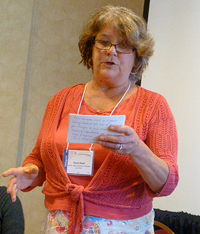The Future of Adult Education in California
By Susan Stuart
The workshop on AB86 was small but packed. Many ideas bounced around, the panel was well informed, and the participants engaged. Discussions revolved around rebuilding adult education programs, what works, what hasn’t in the past, and which changes seem appropriate and necessary.
The purpose of AB86 (Section 76, Article 3) is to provide grant funding (up to $25M) to regional consortia to create and implement plans to better address the educational needs for the adults in each region. This education applies to elementary, secondary and basic skills classes for high school diploma or equivalency certificate; courses for immigrants eligible for Citizenship, and ESL workforce preparation; programs for adults with disabilities or for apprenticeships; and short-term Career Technical Education programs with high employment potential.
Since the early 1970s, most Adult Ed programs have been budgeted for and administered by K-12 districts although some college districts took over some programs, and by 2008 all adult education funding was sharply cut across the board. In 2013, the Community College Chancellor’s Office (CCCCO) was tasked by the legislature to allocate funding for two-year planning and implementation grants.
If a consortium (usually at least one community college district and several K-12 districts) applies for and receives a Certificate of Eligibility, it receives money from the General Fund. This initial grant is not at this time an ongoing funding source after 2016 although all current K-12 finding will be still in place. The value and success of consortia to redesign Adult Ed. partnerships that improve upon current programs will make or break the future of this vision.
The Regional Comprehensive Plan’s Seven Objectives to be addressed within consortia:
- Evaluate current levels of programs and administration of
- Evaluate current needs of adults in the region
- Plan to integrate existing programs and improve counseling
- Address gaps in existing programs
- Plan to accelerate students progress – staffing, counseling, ed. plans
- Plan to collaborate on professional development opportunities within the region
- Plan to leverage existing regional structures and opportunities
There was discussion about how CBOs (Community Based Organizations) fit into this picture with concern that private entities not be able to benefit financially from these state funds. There was input from those who were having ongoing success with partnerships between K-12 and CC Districts (Glendale over thirty years!). Consortia operating now in our neighborhood include the South Bay Consortium: West Valley-Mission College District, San Jose Evergreen College District and five local K-12 districts are on track. There are seventy consortia in California. Jack Carroll, our local (Pajaro district) rep., was there and will stay in touch with us here at Cabrillo about further involvement and meetings.
All in all, it was a very informative and interesting afternoon! (My one question – ‘How does a student know whether to take an ESL class at Adult Ed or at her community college?’ was answered that these new partnerships would guarantee more counseling and development of individual ed plans by funding more staff and quality of resources).
